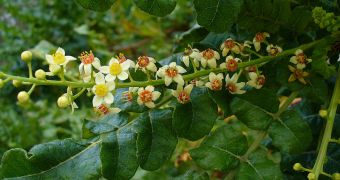Frankincense plays an important part in the Christmas traditions. According to the Bible, the three wise man offered frankincense, an aromatic wood resin, to baby Jesus, as a gift.
Its powerful symbolism is the main reason why resin obtained from these trees is so popular, especially around this time of the year. Unfortunately, the profitable but unsustainable exploitation is putting the Boswellia trees in danger, ENS informs.
Also, rumor has it that frankincense, the sap obtained after tapping Boswellia sacra growing in the Dhofar region of Oman has super powers in fighting cancer.
This opinion is shared by immunologist Mahmoud Suhail, who thinks this element contains an agent that can stop the evolution of cancer, according to NaturalNews.
It seems that the miraculous resin can perform beneficial changes and resets the DNA code damaged by cancer cells. Although it sounds promising for all cancer patients, the newly-discovered feature puts the trees at further risk.
A recent study, published in "Journal of Applied Ecology," highlights overexploitation makes these vulnerable trees produce less seeds.
Christmas traditions are encouraging the expanding frankincense trade, supported also by the market of incenses and perfumes that consider it an important ingredient for their products designed especially for the winter holidays.
It appears that this species is trying to overcome the harmful effects of human exploitation by redirecting carbohydrate into resin, disadvantaging flowers, seeds and fruits.
Researchers have managed to prove this theory after comparing the condition of tapped trees with untapped ones from the same species.
"This study strongly suggests that there is competition between investment of carbohydrates in sexual reproductive structures and synthesis of frankincense in Boswellia papyrifera," explains Professor Frans Bongers from Wageningen University, an expert who has been studying this phenomenon for six years.
In order to control the irreparable damage, experts agree that local people from Nigeria, Chad, Sudan, Kenya, Tanzania, Somalia, Yemen and Oman should limit their tapping operations.

 14 DAY TRIAL //
14 DAY TRIAL //